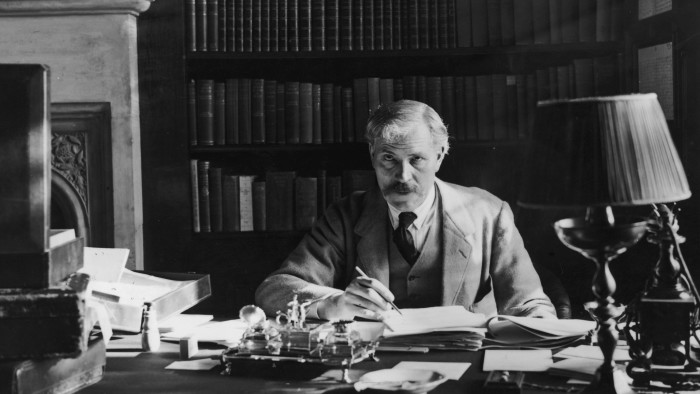Unlock the Editor’s Digest without spending a dime
Roula Khalaf, Editor of the FT, selects her favorite tales on this weekly publication.
The author is professor of politics at Queen Mary College of London
Since Labour first entered authorities in 1924, a complete of 13 of the social gathering’s MPs have served as authorities chief whip. Few had a straightforward time of it. The connection between Labour’s entrance and backbench has been a perpetual drawback for the social gathering — with welfare reform an everyday bone of rivalry, then as now. This week’s authorities climbdown over cuts to incapacity advantages is but extra proof that parliament is changing into more and more tough for prime ministers to deal with.
Welfare precipitated each the primary main rebel of the Blair period, over lone dad and mom, and the biggest revolt within the 1997 parliament, when 67 MPs defied the whips over incapacity profit. There have been additionally vital rebellions over profit reforms towards James Callaghan, Harold Wilson, Clement Attlee and Ramsay MacDonald.
On one single day in 1931 throughout MacDonald’s second authorities, Labour backbenchers voted towards authorities unemployment measures in 32 straight divisions — the very best variety of consecutive rebellions to happen in sooner or later in any Labour authorities earlier than or since.
In 1924, the primary Labour authorities noticed virtually 4 out of each 10 members of the parliamentary social gathering insurgent over unemployment profit; as a proportion, this stays the biggest ever rebel by Labour backbenchers, bigger (in proportion phrases) even than the 2003 revolt over Iraq — when a 3rd rebelled.
So former Labour chief whips would perceive Sir Alan Campbell’s difficulties in dealing with the threatened rebel of the previous few days — though they could nonetheless be shocked by a number of the particulars.
It isn’t particularly the size that’s uncommon right here — over 120 Labour MPs. Such massive rebellions have more and more develop into a reality of life. Blair Iraq rebels numbered 139, Theresa Could was defied by 118 Conservatives over Brexit (once more, as a proportion of the parliamentary social gathering, this was even bigger than the Iraq rebel). John Main, David Cameron and Boris Johnson all suffered revolts of over 90.
But such defiance this early in a premiership is extraordinarily uncommon. The most important postwar rebel within the first yr of a authorities got here in 1975 when 91 Labour MPs voted towards a rise in funds for the royal family. However it is extremely a lot the outlier.
Keir Starmer’s present difficulties are partly the results of the maladroit manner the difficulty has been dealt with, however in addition they reveal a shift within the psychology of MPs, who’re, usually, changing into extra impartial and keen to kick towards the pricks.
We would have anticipated this to be a comparatively cohesive and acquiescent Labour consumption (plenty of new MPs, elected final yr after an prolonged interval in opposition). However many are additionally nicely conscious of the unsure political floor beneath their toes; a lot concern they might solely be there for one time period and will not be all satisfied they’re being led by political geniuses. Many wish to draw a line within the sand, after a yr of repeatedly biting their tongues.
Additionally uncommon is the tactic the rebels, a few of them skilled, senior committee chairs, selected — a reasoned modification at second studying was a tactic that threatened to kill all the invoice — a very large deal. It took till Blair’s second time period earlier than there have been any vital second studying revolts. The most important Labour rebellions at this stage have consisted of 72 MPs, a report held collectively by the Increased Training Invoice (2004), which considerably raised the extent of tuition charges, and the Nationwide Service Invoice (1947) introducing peacetime conscription.
To know how uncommon it’s to have been discussing the potential lack of a authorities invoice this week, you want solely contemplate that since 1900, there was only one event when a authorities with a safe majority within the Commons has misplaced a invoice in its entirety at its second studying.
In 1986, Margaret Thatcher’s Conservative authorities went right down to defeat over a doomed try and liberalise Sunday buying and selling hours. Within the largest rebel of her period, some 72 Tory MPs defied their whips, with others abstaining.
That debacle got here deep into Thatcher’s second time period — by which level backbench discontent had been constructing for some time — and on a problem that was not central to the federal government’s programme. In response to the defeat, the federal government shrugged its shoulders and moved on; Thatcher made no additional try and take care of the difficulty. Starmer’s difficulties come lower than a yr in — and on a way more vital coverage.
The federal government’s retreat makes subsequent week’s vote much less thrilling. However it should even have demonstrated to Labour MPs that they don’t have to be bystanders within the coverage course of. Like Arnold Schwarzenegger, they are going to be again.

